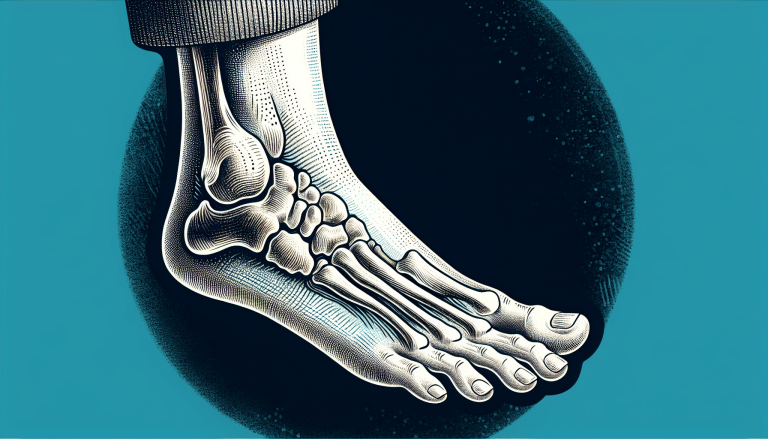Does Toenail Fungus Indicate Health Problems?
Did you know that those little changes in your toenails might be offering clues about your overall health? In “Does Toenail Fungus Indicate Health Problems?” you’ll find out why it’s important to pay attention to seemingly minor issues like toenail fungus. This article sheds light on how fungal infections can sometimes be an early indicator of underlying health issues, from diabetes to a weakened immune system. You’ll learn why ignoring these signs could be a bigger deal than you might think and how your feet could be telling you more about your health than you ever imagined. Have you ever looked down at your feet and wondered if that annoying toenail fungus might be a sign of something more serious? You’re certainly not alone. Toenail fungus, or onychomycosis as it’s known medically, can sometimes be more than just a cosmetic nuisance.
What is Toenail Fungus?
Understanding Onychomycosis
Onychomycosis is a common fungal infection affecting your toenails. It usually starts as a white or yellow spot under the tip of your nail and can quickly spread. Over time, the nail may discolor, thicken, and develop crumbling edges, which can be quite unsightly and uncomfortable.
How Toenail Fungus Develops
Fungi thrive in warm, moist environments, making your feet the perfect breeding ground, especially if you wear closed-toe shoes for long periods. Walking barefoot in communal areas like swimming pools, gyms, or locker rooms can also increase your risk.

Common Symptoms of Toenail Fungus
Visual Signs
Toenail fungus is relatively easy to spot. Here are some common symptoms you might notice:
| Symptom | Description |
|---|---|
| Discoloration | Nails turn white, yellow, or brown. |
| Thickening | Nails become thicker than usual. |
| Crumbling Edges | The edges of the nail crumble easily. |
| Distorted Shape | Nails may have an unusual shape. |
Sensory Symptoms
Beyond what you can see, toenail fungus might also cause discomfort or pain, particularly if the infection is severe.
Causes and Risk Factors
Environmental Factors
Your environment can significantly influence the likelihood of developing toenail fungus. Hot and humid climates create ideal conditions for fungal growth. Wearing synthetic socks and closed-toe shoes that don’t allow your feet to breathe can exacerbate the issue.
Health Conditions
Certain health conditions might predispose you to toenail fungus. These include:
- Diabetes
- Circulatory problems
- Immune system disorders
Age and Lifestyle
Older adults and those with an active lifestyle, particularly athletes, are more prone to fungal infections. Aging reduces blood flow, and nails grow more slowly, making it easier for fungi to take hold.
Diagnosing Toenail Fungus
When to See a Doctor
You might wonder when it’s time to consult a healthcare provider. If you’ve noticed persistent discoloration and changes in your nails’ texture, it’s a good idea to make an appointment.
Diagnostic Tests
A podiatrist or dermatologist might perform specific tests to confirm the presence of fungus. These could include:
- Nail Clipping: A small piece of the affected nail is taken for examination.
- KOH Test: Potassium hydroxide is used to dissolve the nail substances, making fungi easier to identify under a microscope.
Treatment Options
Over-The-Counter Treatments
There are a variety of antifungal creams, ointments, and nail polishes available without a prescription that might work in mild cases.
Prescription Medications
If over-the-counter treatments aren’t effective, a doctor might prescribe stronger antifungal medications. These could be:
- Oral Antifungals: These are generally more effective but can have side effects.
- Topical Solutions: Prescription-strength creams and ointments applied directly to the nail.
Home Remedies
Some people swear by natural remedies such as tea tree oil, vinegar soaks, and garlic. While the efficacy of these treatments can vary, they might offer relief in mild cases.
Medical Procedures
In severe cases, medical procedures like laser therapy or even surgical removal of the nail might be necessary to eradicate the infection.
Potential Health Complications
Infection Spread
Ignoring toenail fungus can cause the infection to spread to other toenails, your skin, or even your fingernails.
Secondary Infections
In severe or untreated cases, the infection can lead to more severe health problems, particularly for those with compromised immune systems.
Impact on Quality of Life
Chronic toenail fungus can be painful and affect your day-to-day activities, from walking to wearing certain types of shoes. It can also impact your self-esteem and social interactions.

Preventing Toenail Fungus
Good Foot Hygiene
Keep your feet clean and dry to prevent fungal infections. Make sure to:
- Wash your feet daily and dry them thoroughly.
- Clip your toenails regularly.
- Use antifungal powders or sprays.
Footwear Choices
Opt for breathable shoes and moisture-wicking socks. You might also consider rotating your footwear to allow shoes to dry out completely before wearing them again.
Safe Practices in Public Spaces
Always wear flip-flops or shower shoes in public showers, locker rooms, and around pools to reduce the risk of picking up fungi.
Monitoring and Early Intervention
Keep an eye on your nails and address any changes immediately. Early intervention can prevent the infection from spreading and becoming more severe.
Myths and Misconceptions
It’s Just a Cosmetic Issue
One common misconception is that toenail fungus is purely a cosmetic issue. While it does affect the appearance of your nails, it can also indicate underlying health problems and cause significant discomfort.
Only the Elderly Get Toenail Fungus
While it’s true that older adults are at higher risk, anyone can develop toenail fungus, particularly those who frequent communal areas or have certain underlying health conditions.
Over-the-Counter Treatments Always Work
While some over-the-counter treatments can be effective, they’re not a guaranteed cure for everyone. Persistent or severe cases often require prescription medications or medical procedures.
Understanding the Connection to Other Health Problems
Diabetes and Toenail Fungus
Individuals with diabetes are at a higher risk for developing toenail fungus. Poor blood circulation and a weakened immune system make it easier for infections to take hold, and the consequences can be more severe.
Immune System Disorders
Conditions that compromise your immune system can make you more susceptible to toenail fungus. This includes illnesses like HIV/AIDS and treatments such as chemotherapy that weaken your immune defenses.
Poor Circulation
Poor circulation can prevent your body from effectively fighting off infections. Conditions like peripheral artery disease (PAD) can make it more challenging to combat toenail fungus and other infections.
When to Seek Professional Help
Persistent Symptoms
If you’ve been treating your toenail fungus with over-the-counter remedies and don’t see any improvement, it’s time to consult a healthcare professional.
Severe Discomfort or Pain
Toenail fungus that causes significant discomfort or pain should not be ignored. These symptoms can indicate a more serious infection that requires professional treatment.
Underlying Health Conditions
Individuals with diabetes, immune disorders, or poor circulation should seek professional help at the first sign of toenail fungus due to the increased risk of complications.
Living with Toenail Fungus
Self-Care Tips
Taking care of your feet is crucial when dealing with toenail fungus. Regularly clean and dry your feet, avoid wearing tight shoes, and consider using antifungal sprays or powders as a preventive measure.
Lifestyle Adjustments
Small lifestyle adjustments, such as wearing breathable socks and shoes, can make a significant difference in managing toenail fungus. Consider alternating pairs of shoes to allow for complete drying between uses.
Emotional Well-being
Living with toenail fungus can affect your self-esteem and emotional well-being. Talking to a healthcare provider or counselor can be beneficial in coping with any emotional distress caused by the condition.
Conclusion: Acting Promptly to Maintain Overall Health
Toenail fungus might seem like a small issue, but it can have significant implications for your overall health, especially if left untreated. By understanding the causes, symptoms, and available treatments, you can take prompt action to manage the condition and prevent more severe health complications. Remember, it’s always best to consult with a healthcare professional if you have any concerns about toenail fungus or your overall foot health.
Additional Resources

Scientists from the Infectious Disease Society of America have discovered that Lamisil actually worsens the itchiness and foul foot smell.
According to researchers, this drug contains two toxic compounds that travel through the body… Until they reach your nails and feed the fungus, making the symptoms 7X worse!
Click here to find out why:







